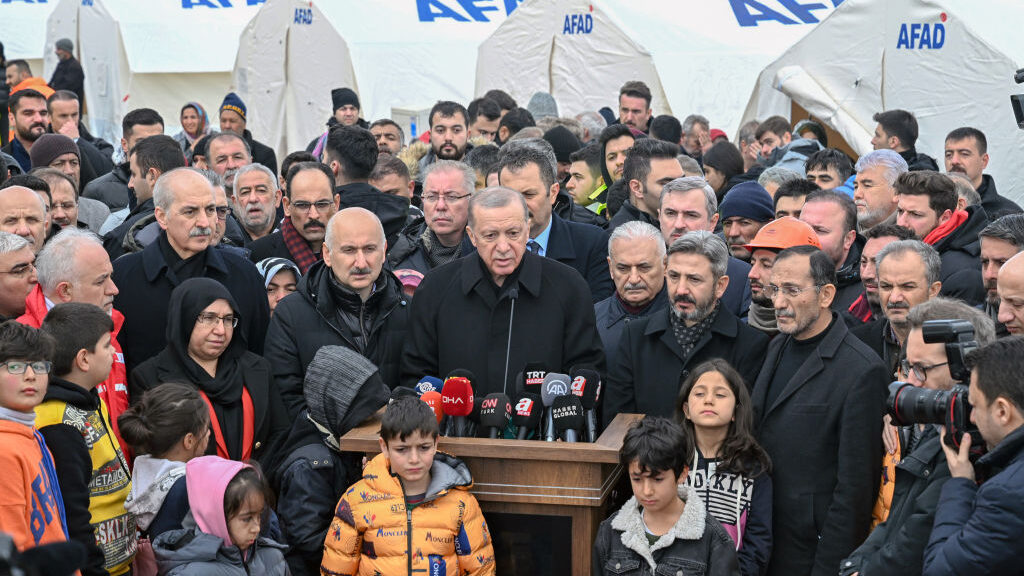Erdogan and the Syrian Regime Following the Earthquake
Al Rai, Kuwait, February 9
The devastating earthquake that struck southern Turkey and northern Syria has had a dramatic impact on the political realities of the two regions. In particular, Turkey’s plan to form a buffer zone within Syrian territory, some 30 km to 35 km deep, has been thrown into question. The Turkish regions that have been affected by the earthquake have seen much of their infrastructure destroyed. Rebuilding these areas will require tens of billions of dollars, compounding the existing economic crisis already gripping Turkey. President Recep Tayyip Erdogan’s grand ambitions to take a dominant role in the region, all the way to Libya, have been starkly revealed as overreaching. He must now reevaluate his plans for 2023 and Turkey’s regional role, as well as the 1923 international treaties that imposed restrictions on Turkey following the fall of the Ottoman Empire, notably with regard to its control of the Bosporus strait. The recent earthquake in Turkey has highlighted the country’s need for support from the United States and Europe if it wishes to be respected as an influential player on the world stage. Erdogan’s attempt to curry favor with Vladimir Putin by purchasing a Russian S-400 anti-aircraft missile system, despite Turkey’s status as a core member of NATO, is a misguided maneuver that will not bring the country closer to its goals. Additionally, the end of Erdogan’s efforts to pressure Bashar Assad into meeting certain conditions and signing a new version of the Adana Agreement of 1998 will be seen as a relief by the Syrian regime. The agreement that enabled the handover of PKK leader Abdullah Ocalan to the Syrian regime allowed Turkey to authorize its forces to enter Syrian territory if necessary. Despite attempts to spread news of international leaders contacting the Assad regime, a sense of relief will not last long. In fact, the world, including powerful Arab nations, will increase its focus on Syria, albeit from a humanitarian perspective, rather than for the purpose of rehabilitating a regime that is aware it is at war with its own people and lacks autonomy in decision-making. The Syrian regime has become a follower of the Islamic Republic of Iran. This development will likely be welcomed by Syrian Kurds, represented by the Syrian Democratic Forces (SDF). The SDF’s ties to the United States will strengthen, and they will have more freedom of action as a result of their relationship with the US and the reduction of Turkish pressure. The devastating earthquake that struck southern Turkey and northern Syria was a tragic event that overshadowed all other news around the globe. But the resulting political realities, both in terms of Turkey, President Erdogan and its regional role, and the Syrian regime, cannot be ignored. The fate of the Syrian regime is now hostage to the destiny of the Iranian regime and the various regional issues it is associated with. Ultimately, the Western world will return to its interests in how to address Iran’s nuclear program, as well as the Iranian regime’s destructive role in Iraq, Syria, Lebanon, Yemen, and elsewhere. Attention will be paid to Iranian militias and their presence in southern Syria, and whether or not Iran will respond to the recent Israeli strike which targeted a key military site in Isfahan possibly linked to the production of ballistic missiles. Here, it is worth noting the growing possibility of US-Israeli coordination on Iran and its activities outside its borders. The devastating earthquake in Turkey and Syria has brought to the forefront not only the human tragedy of the event, with an estimated 20,000 dead and tens of thousands of displaced people but also the political ramifications. The earthquake raises questions about Turkey’s role in the region and the world. President Erdogan had been hoping for 2023 to be a year of new beginnings for Turkey, with the removal of restrictions imposed by treaties signed a century ago. The success of this will depend on two things: the outcome of the May elections and Erdogan’s ability to face reality rather than cling to illusions. It is up to Erdogan to be more realistic in his dealings with Greece, rather than using it as a campaign issue for internal voter mobilization. –Khairallah Khairallah (translated by Asaf Zilberfarb)
This holiday season, give to:
Truth and understanding
The Media Line's intrepid correspondents are in Israel, Gaza, Lebanon, Syria and Pakistan providing first-person reporting.
They all said they cover it.
We see it.
We report with just one agenda: the truth.



